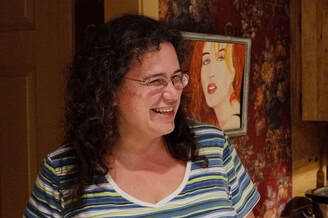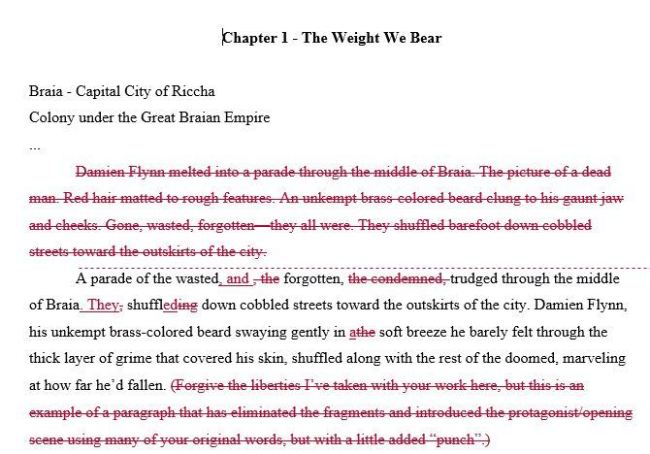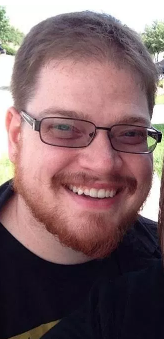|
Guest Blogs |
 By Laura Sherman You’ve been dreaming of writing a novel and now have the time to do so. You sit down at your computer and stare at the blinking cursor on the blank screen. You know the story concept you want to write but have no idea how to start. Instinctively, you know that “It was a dark and stormy night” probably isn’t the right beginning. But what is? To ensure that you communicate your concept effectively, you need to prepare to write your novel. Here are a few tips to get you started. 1. Outline your story idea A budding writer recently asked me for advice. She was having trouble writing the ending for her book and was stuck. The problem was that she had set off without a plan and then found she’d written her character into a situation she couldn’t resolve. While some people feel that they can write a novel by just typing away with no preparation, that approach can be difficult and frustrating for a new writer. It is true that magic is created when you’re engrossed in the writing process, but I find that it’s most effective to prepare to write your novel before letting your story flow from your fingertips. I find that when I am properly set up, the process is smoother because I have guideposts and mile markers to help me find my way. Writing without a plan is a bit like taking a road trip by just choosing a compass direction and taking off. It could be a brilliant choice, or you might drive for two hundred miles to discover a small town that doesn’t even have a motel. Sure, it can be an adventure, and I’m sure you’d get something out of it; but if you’d done a little research, you may have found a National Park two hundred miles in a different direction with glorious waterfalls and amazing views. Similarly, outlining before you write will save you from wasted time and words. It will save you from the disappointment of tossing thousands of words later. There are many ways to outline. One way is to write a rough summary. It’s a bit like sketching the image before you apply paint to the canvas. Just summarize your story in a few pages. Don’t worry about grammar. Do be sure to include all major plot points. Another system I like to use involves a journalistic approach to each incident in the book. I like to jot down:
For instance, I might create an incident like so:
Since the outline consists of notes from you to you, the form it takes really doesn’t matter. What’s important is that the method helps you to prepare to write your novel.  2. Shape your story Now that you have a list of incidents or a basic outline of the story, it’s time to shape it into a format that will work. If you’re not familiar with the three-act structure, it’s worth looking into. Once you understand it, review a few of your favorite books and movies and see how they incorporate the three acts into their story. Then consider how your story can fit into that structure. In addition, it’s time to consider the arcs your characters will follow throughout the story. The main characters need to follow paths that make sense for your book. Although you might decide to work out the details of their journeys as you write your novel, you should have a rough idea of where they’re going and where they’ll end up before you start. Conflict is a key element for any story. Throughout your book, your main characters should encounter many conflicts and difficulties along the way. These serve to raise the readers’ heart rates as they turn the pages or swipe forward. Suspense and mystery help keep readers interested. As you take these factors into consideration, your outline or summary may need adjusting. That’s normal. At this phase, your story is a bit like clay that you can mold and squish into the shape you desire. After all, you’re the creator. 3. Get to know your main characters A great story has strong, believable characters. As you prepare to write your novel, you can get a head start on creating characters that your readers will identify with and cheer for. Start by jotting down notes about your main character. If you feel stuck, imagine that you are interviewing him. Prepare questions ahead of time. It might help to start with a detailed physical description. Then write down basic information about him, such as:
If you still feel that your characters are disconnected strangers, imagine putting two characters into a room together. Set up the scene and watch how they interact. Take notes. Observe their mannerisms as well as their dialogue. Write it all down. You’ll learn a lot about them in this way. Don’t worry about bit players in a scene. Although adding a few words of description can help set the scene, you don’t need to create a biography for the ballroom dancing instructor who appears only on page 39.  4. Build the world If you’re writing a science fiction or fantasy story, you’ll need to spend some time building your world. This is a lot of fun! The laws of physics might not be the same, nor will the native plants and animals necessarily resemble those of Earth. Consider the history of the races that inhabit your world. What makes them distinctive? One writing coach suggested to me that it helps to keep the setting somewhat familiar for the reader and change up only a few key things. If everything is completely different, it makes it hard for people to relate easily. They’ll get confused and put the book down. Also, you can wind up spending a lot of time explaining the nuances of the world, which can be boring and pull the reader out of the story. As you prepare to write your novel, think of all the aspects of the world that you will need the reader to understand. Sometimes it works to create intricate background stories that delve into the history of the society. Of course, it’s never a good idea to dump this data in a prologue or first few chapters, as it clogs up the story with a lot of facts. Instead, talented authors weave information seamlessly into the story. However, you, the creator of this world, must understand the basics of the universe that you’re building so that you can craft your story within the rules and guidelines of it. For instance, for the Harry Potter series, J.K. Rowling spent some time working out the rules of the magical people. She had to do that to keep everything consistent throughout all the books. Part of that process would involve sketching out the characteristics of the basilisk, the boggarts and the dementors ahead of time. Some authors enjoy creating detailed maps of their worlds, to orient the readers with the layout of the land. You’ll also sometimes find detailed genealogy tables for a family of characters in the book. There are many ways to build a world. Select the ones that work for you and your story. 5. Set yourself up for success It’s easy to say that you want to write your novel. It’s another matter altogether to create a plan to actually do it. I’m reminded of the “Just Do It” motivational video that circulated a few years ago. There’s some truth in that statement. Sometimes you just need to bypass all the distractions that inevitably will crop up and decide that you’re going to complete your book. However, there are a few things you can do to set yourself up for success. Find a comfortable spot to write This might be your bed or your dining room table. It might be a lawn chair in your back yard. Or it could be a bench at a nearby park. It helps to have a steady and established spot, where you know what to expect in the environment. Comfort is important. Make sure your seat is comfortable, giving you the back support you need. Your space should be as free from distraction as possible. Definitely don’t put yourself at the center island of your kitchen when the children are all home and running around. You’ll get interrupted in multiple ways. Ideally you have a room where you can close the door (and maybe lock it). Find your writing time When I was younger, I did my best work at midnight. Honestly, I couldn’t think with doing anything meaningful before 10am. Nowadays, I like to write in the mornings. I have three kids and find that I write the best before everyone gets up. 6am is a great time! I recommend selecting the right time of day for you, then working consistently at that time every day. If you’re serious about writing a book, you’ll need to put in at least one hour. Remember, it takes a while to get into the groove, so giving yourself a 20-minute window will just be an exercise in frustration. Set realistic targets Some people might find it more productive to set a word-count writing target each week than a time goal. If you are a daydreamer by nature, time targets won’t help. After all, sitting in front of your laptop building castles in the air for thirty minutes isn’t going to help you write your novel. So, how many words should you plan to write a day? That really depends on you. You can estimate that 250 words is about a page, so I’d encourage you to write a few pages each day. When I get going (and I’m well set up with an outline), I tend to max out at 5,000 words. After that, it becomes an unintelligible jumble of syllables. Set a daily, a weekly, and a monthly target. Also, decide on a final deadline for your book. Then make those targets, or better yet, beat them! Being a mother of three children, I’m a planner at heart. I believe that if you really want to write your novel, you need to properly prepare and follow through with the targets you establish. Set yourself up for success and don’t accept failure as an option.  Laura Sherman (aka the Friendly Ghostwriter) has been helping authors write their stories for twenty years. When she’s not busy building worlds for her clients, she homeschools three children as the family travels the country in her RV.
104 Comments
Written by Mark S. Moore
Author of Rise: Birth of a Revolution https://twitter.com/RedBeardFlynn https://www.instagram.com/redbeardflynn/ marksmoorebooks.com Let me couch all of the following by saying that I am talking from my point of view. This is based on the experiences I had and I am giving my recommendation. I feel strongly about much of what is written here and the wording will be as such. However, I am no expert. Do you need an editor?First and foremost, yes you need an editor. Let me repeat that. Yes, you need a damn editor! This is especially the case as a self-published author. Situations will vary when you start involving publishing houses and I am not able to comment on that. When you are self-published you are also responsible for the crap you put out. You can make it less crap by finding an editor. I think this was one of the most difficult things for me to realize after spending the better part of 2 and a half years on my book. I’d already sent it to friends and family and I’d had it torn to shreds in a writer’s group. In some ways I felt like I had done my due diligence. Beyond that, the cost is not something to ignore. To put things in perspective, I need to sell over 500 ebooks to break even with just my editing costs. It was worth every penny. When am I ready? What kind of Editing do I need? There’s no easy answer to this. These two questions need to be answered together. Let’s start with the basics. Since I used the Editorial Freelancers Association to find my editor I might as well go there for my descriptions. (www.the-efa.org/hiring/member-skills/) I’ll focus on the three most relevant types for self-published authors, at least in my humble opinion. Developmental Editors – develop a book or other project from the initial concept onward, working closely with the author or client to study competing works and create a product that stands out. $$$$ Line/substantive/content editors – I caution that there are other editors and other sites that will not use these as interchangeably as the EFA does but the gist is: Editors who mage significant changes to a manuscript, such as rewriting and reorganizing text. $$$ Copyeditors – Correct spelling, grammar, usage, and punctuation, check cross-references, and prepare the style sheets that guide consistency and accuracy across the manuscript. $$ Proofreaders – check the text for errors, including typographical errors and problems with typesetting specifications and page makeup. They compare the latest stage of the project to earlier stages and make sure changes have been made correctly. $ It’s important to realize that no longer how much blood, sweat, and tears you have put into your manuscript you still need editing. Not only that, but you probably still need more editing than you want to pay for. I’ve indicated on the descriptions the cost scaling but that’s just a general idea. It varies greatly by the editor and by the manuscript. I went into my search with the assumption that I needed a Copyeditor. I ended up with the equivalent of a Line editor based on my manuscript. However, I got very lucky and I’ll explain why later. Finding an Editor My process started where many of you will. I went to Bookbaby, Kirkus, etc…all the big editors. I compared their pricing and then (this is probably where our paths diverge) grovelled to my wife asking if we could afford editing. I can’t remember who suggested EFA. It must have been a blog I google searched or someone from my writer’s group. Whenever I find it I’ll have to give them credit. EFA, as mentioned before, stands for the Editorial Freelancers Association (www.the-efa.org). This site is many things, but most importantly it’s a place where you can post your job. Prepare to be inundated with talented editors bidding for your services. Perhaps bidding isn’t the right term. I don’t recall anyone budging on pricing but I also wasn’t trying to convince any editors to lower their price either. When posting I set a few goals for myself and I strongly suggest it. I would have been completely overwhelmed with EFA if not for these rules I set for myself. For this list, to me, 1 was the most important down to 5, the least important.
What happens after you post to EFA?You know those terrible off-color jokes about outing yourself as a female on the internet? “Prepare your inbox.” There’s no other way to put it really. You are going to be absolutely flooded. My final count after two weeks was 108 individual e-mail responses. That does not include any follow-ups, just straight-up responses from freelancers seeking work. To say this was overwhelming doesn’t do it justice. I am not an organized man. I have an inbox with 39,000+ unread e-mails because I can’t be bothered with it. My wife is the polar opposite and keeps meticulous track of e-mails and has spreadsheets for my queries. She, however, was busy when my inbox blew up. So I started the process of weeding through them. 1. Go with your gut. This sounds a little silly, but it worked for me. First impressions were very important. I dismissed several that seemed unprofessional right off and after going through dozens with this “gut” test I found about fifteen I wanted to follow up with. 2. Follow up. Yes, you can actually ask follow-up questions! This was important to me. I asked every editor the same questions and gauged their reactions to the questions and the follow-up. Two of those fifteen eliminated themselves by not responding at all, a third eliminated themselves by taking two weeks to respond. 3. Sample, Sample, Sample. Every editor worth their salt will offer you a sample. This is their preview of their work and how it will mesh with yours. Think of this like the 20% sample you’re going to be giving readers before they purchase your book. Samples will range from 500 words to 2500 words, mostly. I tried to limit the number of sample requests I made to people I was seriously considering. I did not want to waste any editor’s time. I used the same sample for everyone, though I met their word requirements. Through this process I learned that there are some writers who will take advantage of samples. First 1000 words to one editor, next 500 to another, and so on. Don’t do that, please. Respect your editor the way that you wish to be respected. 4. Be transparent. Editors will be aware they are bidding against others. Don’t play games. Again, respect your editor the way that you wish to be respected. It goes a long way to creating a working relationship when you are open and up-front from the start. I never once misled any editor I was speaking with and I felt like they treated me the same. I was not trying to play pricing games with them but instead I was just trying to find the best editor for me and for my book. 5. Pick. Eventually you’ll have to make this choice. If I’m being honest I probably dragged it on too long. I was stuck picking between four editors, one of whom I’d initially eliminated but came back to. Of these four, there was some guilt associated with telling three of them ‘thank you, but it’s a no’ because they had already invested time and effort. I tried to be aware of that when notifying them. Be appreciative of these editors you nearly picked, they have done more for you than you have for them at this point. This is where things will be different based on what editor you have chosen and how you are approaching it. I’ll have to write another post detailing that process with my current editor. For now, I would like to leave you with a few of these editors who I very nearly chose and who were an absolute joy to work with. Everyone I have chosen to list here I respect and hold as the examples for which editors should aspire. The people have set very high expectations with their professionalism and talent. When I was making my final decisions I was faced with such a terribly difficult choice because any of the listed editors below would have made my manuscript much better and I would have enjoyed working with any of them. We’re talking razor-thin margins of difference and I was honored that any of them considered working with me on Rise. I very strongly recommend them.
|
AuthorThese are posts made by friends of Wordrefiner. I am grateful to share these with my guests. Archives
May 2023
Categories
All
|


 RSS Feed
RSS Feed